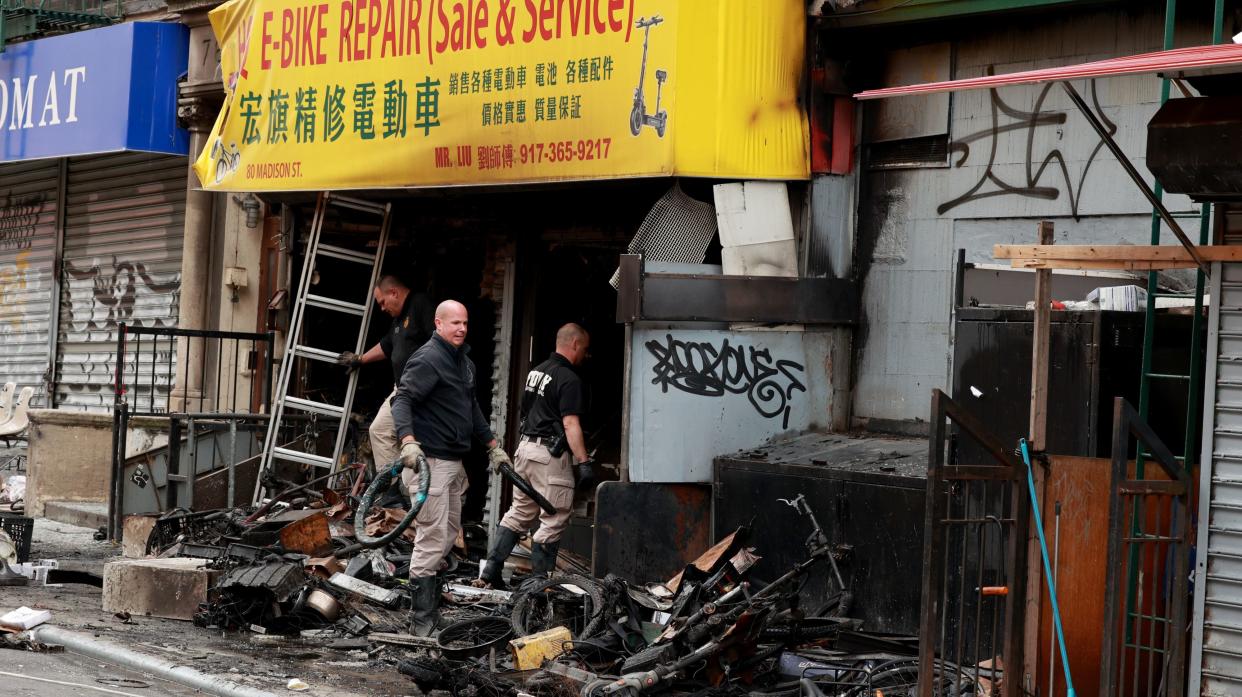Ten NYC e-bike shops charged with violating lithium-ion battery safety rules after Manhattan blaze killed four, FDNY says

Ten e-bike shops across the city have been cited for unsafe handling of lithium-ion batteries since a blaze Tuesday blamed on e-bike batteries killed four Manhattan residents, FDNY officials said Friday.
The shops were hit with 11 civil law violations, three civil court summonses and two criminal court summonses for inappropriately storing and charging combustible e-bike and scooter batteries, FDNY Fire Marshal Daniel Flynn said, speaking at a public safety briefing at City Hall.
The Fire Department was tipped off to the non-compliant bike shops by 311 callers, news reporters and public officials since Mayor Adams on Wednesday vowed a crackdown on sketchy e-bike vendors and bike repair shops that fix lithium-ion batteries, Flynn said.
The Fire Department did not share the addresses of the shops nor provide a breakdown of the violations Friday, citing the ongoing investigations.
A FDNY source said the criminal court summonses were filed against one shop for “excessive battery storage” and for using power strips to charge lithium-ion batteries — careless practices that can spark battery fires. The same shop previously was cited for using power strips, the source said.
A lithium-ion battery sparked a deadly inferno inside the HQ E-Bike Repair shop early Tuesday on Madison St. in Chinatown, the FDNY said.
The fire and smoke quickly billowed through the building after starting inside the street-level business and the flames were so intense they burned through the store’s roll down gates, witnesses said.
Four building residents died from smoke inhalation. Two others were hosptialized with critical injuries, but are expected to survive.
Authorities said the Chinatown business was twice cited by the city since 2021, with a failed inspection last year leading to a $1,600 fine. Fire marshals said the e-bike business violations included charging batteries stacked next to each other and plugged into extension cords.
Lithium-ion batteries have been responsible for 110 fires that resulted in 71 injuries and 13 deaths so far this year, Flynn said. The death toll so far in 2023 is already more than double the six deaths reported in 2022.
If the current pace holds, deaths blamed on burning lithium-ion batteries in 2023 will be quadruple the 2022 toll. Only four deaths were linked to e-bike battery fires in all of 2021, FDNY officials said.
“It’s a new problem and its a big problem,” Flynn said, explaining that fires caused by the batteries spread rapidly.
“Fires traditionally start small and become large,” he said. “These fires — they go from zero to 100 in a second.”
Sixteen e-bike shops have been inspected since Tuesday, FDNY officials said. City residents called in six tips to the 311 system, giving the FDNY four spots to look at. Two of the callers gave 311 an address the FDNY had already been tipped off to.
Eight of the shops visited since Tuesday had been inspected before and were already on the city’s radar as trouble spots, he said.
Besides inspections, the FDNY and the city’s Department of Small Business Services have been going to local bike shops that sell or repair lithium-ion batteries to make sure employees know how to properly store, plug in and charge the batteries.
“We are not trying to vilify anyone who uses them or sells them,” he said. “We just want them to be used safely.”
The mayor on Wednesday urged New Yorkers to remain alert to warning signs in stores such as the sale of refurbished batteries, “mazes of extension cords” and lack of proper licenses.
Any suspicious spots should be called in to 311 and local firehouses will investigate complaints within 12 hours, Mayor Adams said.
So far this year, the FDNY has completed 220 inspections of e-bike stores, charging areas and repair shops across the city which have resulted in 495 summonses for building and fire code violations with fines ranging from $1,000 to $5,000, Flynn said. The civil summonses are adjudicated by the city’s Office of Administrative Trials and Hearings.
Of those 495 summonses, 139 were issued for “more egregious and hazardous violations,” Flynn said.

